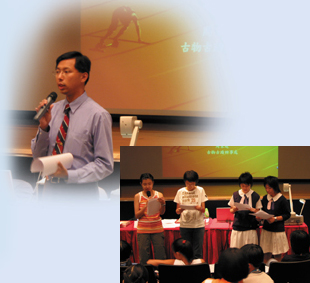 |
| |
|
| |
| |

Speaker:
Moderator: |
Mr Kelvin Chow
Research Officer, the Antiquities and Monuments Office
Dr Fang Jun
Senior Lecturer and Deputy Head, Department of Social
Sciences, HKIEd |
Oral history is one of the many ways to
conduct historical research. By collecting raw data2 through
interviews, one is able to complement written archives and records.
Oral history helps to widen the perspectives of historical research
by involving informants, members of the general public, in the
compilation of history, thus enlivening the historical record.
Mr Chow used concrete examples to explain the different aspects
of oral history, including data2 collection, identification of
interviewees, design of interview questions, recording, archive
management and legal liabilities. Students were encouraged to
apply oral history research to SARS project studies.
 |
| Participants discuss and present
in groups the planning of oral history research
during the workshop. |
| |
|
|
A student
of TWGHs Wong Yee Jar Jat Memorial Primary School
˙
˙
|
I have acquired skills
for collecting information and doing interviews.
I have learnt
more about oral history. This will help
me to be more confident in conducting interviews.
|
|
|
|
|
|
| |
|
|
|


